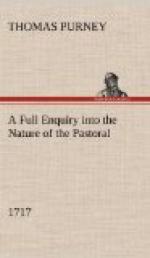The gentle Shepherd sate beside a Spring.
All in the Shadow of a Bushy Breer. &c.
In this last Line, there is but one Word end’s with a Consonant, where the following Word begin’s with one. But a Writer, who is perfectly Master of his Language, will be able to have every Line like this; and no Word more strong than Evening, Rivulet, and the like, will he be forc’d to use.
Secondly, The Language is by nothing more weaken’d, than by the use of Monisyllables. This no one ever had the least Notion of but Spencer. Which I wonder has not been observed, ’tis so very palpable in him. What makes the finess of these Lines else?
All as the Sheep such was the Shepherd’s look, For pale and wan he was (alas the while!) May seem he lov’d, or also some Care he took, Well could he tune his Pipe and form his Stile.
Past. 1.
Here is but two Words for four Lines, except Monosyllables.
The best Lines in PHILIPS, for the Language, are these, where Monosyllables reign.
..._Fine
gain at length, I trow,
To hoard up to my self such deal of Woe!_
And the last of these; for the first is rough thro’ too many Consonants.
A lewd Desire strange Lands and Swains
to know:
Ah Gad! that ever I should covet Woe!
Past. 2.
There are other Methods, I see, Cubbin, you have taken to enervate your Language; too minute and too numerous to recite, but they are easily, I think, observ’d, if a Person peruses the Pastoral Writers with Care.
When our Dialect is thus render’d weak and low, we must then add to it, (in order to render it as pleasant as a Dialect that is not low and mean) Simplicity, Softness and Rusticity. This is perform’d principally by these three things. By Old-Terms; by Turns of Words, and Phrazes; and by Compound Words. Of all which I shall crave leave to treat distinctly. And first of Ancient Terms.
SECT. 2.
Of Old-Words.
When first I look’d into Chaucer. I thought him the most dry insipid Writer I ever saw. And there is indeed nothing very valuable in either his Images or Thoughts; but after a Person is accustom’d to his manner of Writing and his Stile, there is something of Simplicity in his Old Language, inimitably sweet and pleasing. If ’tis thus in Chaucer, in Pastoral such a Language is vastly more delightful. For we expect something very much out of the Way, when we come among Shepherds; and how can the Language of Shepherds be made to differ from that of other Persons, if they use not Old-Words?
’Tis very remarkable that all our greatest Poets whose Works will live to Eternity, have introduced into their Language Old-Words; as Shakespear, Spencer, Milton. Dryden also, whose Genius was much inferiour to those Writers; has used some few. And Ben. Johnson (tho’ he lived at the same time with Shakespear, Spencer, &c.) whose Genius was yet meaner than Dryden, has not one Old-Word.




